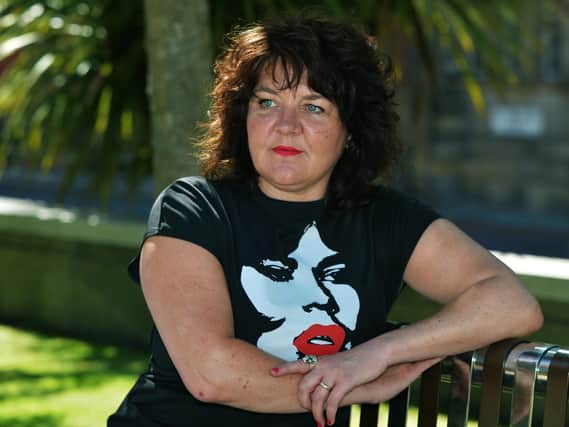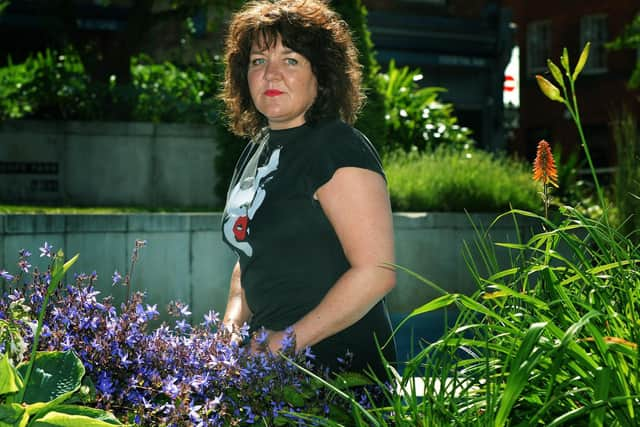'We need to bring it to people's attention that it is a very real grief'


Faye Dawson said the fact that women are dissuaded from telling people they are pregnant until after 12 weeks risks them feeling that their grief is not valid if they suffer an early miscarriage.
Faye, 49, of New Farnley, Leeds said: "We do need to challenge the stigma around early miscarriage.
Advertisement
Hide AdAdvertisement
Hide Ad"It is not talked about enough. And we need to bring it to people's attention that it is a very real grief."


Faye, a self employed public relations consultant, said she met her partner Alan Dawson in December 2008 when she was in her late thirties and he was in his early forties.
The couple got married in September 2009 and Faye became a step mum to Alan's two children from a previous relationship.
Faye was aged 42 when she first fell pregnant in September 2013.
Advertisement
Hide AdAdvertisement
Hide Ad"We were very excited and worried and scared," said Faye, who was left devastated when she suffered a miscarriage when she was eight to ten weeks pregnant.
"I didn't understand why I felt so upset," she said.
"I didn't understand my own grief at all because for a long time we have been told early miscarriage is just a bunch of cells and 'you can try again, it wasn't yet a baby.'
"There is a lot of stuff around early pregnancy that is really quite negative for pregnant women, specfic to early miscarriage."
Faye said she suffered her second miscarriage at around ten weeks in August 2014, but only told her family and close girlfriends what had happened.
Advertisement
Hide AdAdvertisement
Hide Ad"It was a couple of years later before I realised or understood that actually this idea of not telling people until 12 weeks is really unhelpful to a lot of women," said Faye.
"For a long time women have been told to not tell people they are pregnant until their three month scan, because early miscarriage is very common.
"That in itself is very dismissive of the first trimester of being pregnant, as if that doesn't really matter.
"This is not about pointing fingers at people, this is about making a change and understanding a little bit more that that person, that couple, has actually lost a baby.
Advertisement
Hide AdAdvertisement
Hide Ad"So what I want to champion is the chance to be able to tell people so that there would be more understanding and support for the loss.
"It is a choice, you don't have to tell people.
"It doesn't feel like a choice at the moment. It is fine if you don't want to, but to know that it is a choice is important."
Faye said she and her husband Alan decided to stop trying for a child after her second miscarriage.
"I was quite traumatised. I was annoyed and upset and I didn't understand my feelings," she said.
Advertisement
Hide AdAdvertisement
Hide Ad"I was in a bit of a mess really and I just thought I don't want to go through that again.
"I have two beautiful stepchildren and I am very privileged to have a happy life. I just thought, 'do you need to put yourself through this?'
"That doesn't mean there aren't times when I am sad that I don't have my own children, but also it's about not feeling like that all of the time.
"I started writing a blog exploring my own family and, through that, people started talking about it and responding to me about miscarriage.
Advertisement
Hide AdAdvertisement
Hide Ad"People told me they have had early miscarriages and not told anybody at all, which is upsetting.
"Some people had chosen to keep it to themselves and their partner, which is absolutely fine.
"It just needs to be understood that it's a choice, that you can talk about it.
"Some people don't want to talk about it and that's fine, that's totally valid.
Advertisement
Hide AdAdvertisement
Hide Ad"Several people said to me that putting those words together about not understanding my own grief was really beneficial to them and their experience, because they too hadn't understood their own grief."
Last week a card to specifically acknowledge the sadness of miscarriage went on sale at a major retailer, in what is thought to be a UK first.
Wakefield-based charity Miscarriage Association has teamed up with the Card Factory - which also has its HQ in Wakefield - to offer a card to help break the taboo of pregnancy loss.
The new card carries the simple but sensitive message ‘There’s no good card for this. I’m so sorry for the loss of your baby’ in the handwriting of someone who has been through miscarriage herself.
Advertisement
Hide AdAdvertisement
Hide AdFaye said: "The card is lovely, but also on a wider scale that card on a shelf in a card shop just makes people think about the upset around early pregnancy and that people have lost and that there is grief."
The card also also carries details of how to access the Miscarriage Association’s free information and support services.
Miscarriage Association National Director Ruth Bender Atik said: “An estimated one in four pregnancies end in miscarriage.
“For many women and their partners, miscarriage marks the loss of a baby and the hopes and dreams they had for their family.
Advertisement
Hide AdAdvertisement
Hide Ad"It can be deeply distressing and yet it’s still something that many people find difficult to talk about.
"There is a still a perception that pregnancy should not be talked about until after 12 weeks, when it’s ‘safe’ to do so. But that means that for a great many people they may end up experiencing miscarriage alone.
"If you have not yet told anyone you are pregnant, it can be harder to tell family, friends or your colleagues about your loss – and to seek support.
“There are often feelings of guilt and shame around miscarriage and, as a society, not speaking about it, can compound those.
Advertisement
Hide AdAdvertisement
Hide Ad"Breaking the silence around miscarriage helps people to understand they are not alone in their experience and helps to validate their feelings of grief and loss.
“Not everyone will want to talk about it, and nor should they have to – it is down to the individual to decide what is right for then. But we would like to create a world in which people know that miscarriage happens and that it can be really distressing, where that loss is acknowledged and where people do not feel they have to go through it alone.”
For more information or to seek support, go to www.miscarriageassociation.org.uk
Comment Guidelines
National World encourages reader discussion on our stories. User feedback, insights and back-and-forth exchanges add a rich layer of context to reporting. Please review our Community Guidelines before commenting.